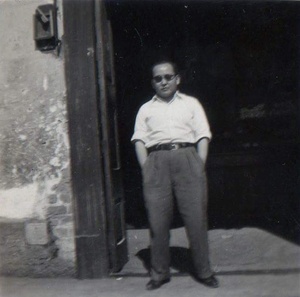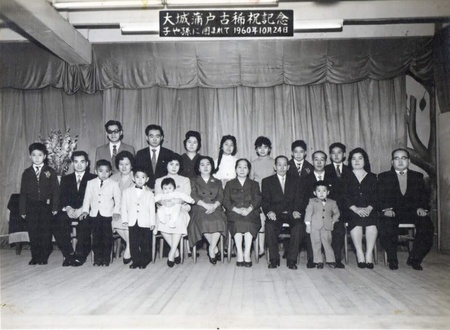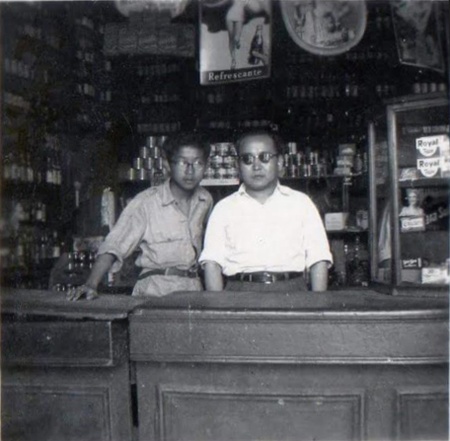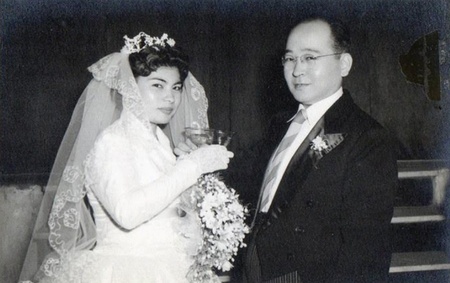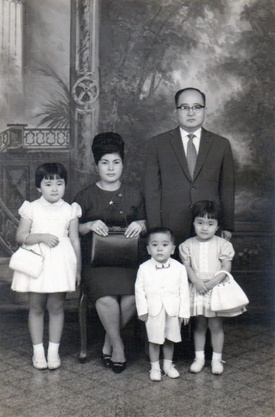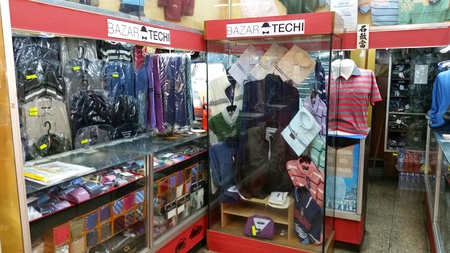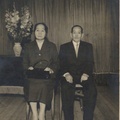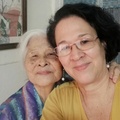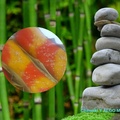To tell this story, I have to go back to when my grandparents came from Japan, specifically from Okinawa, like most, they came to work in agriculture, they had their children, one of them my father, who, like his brothers, from a or otherwise they worked in the field, at the Hacienda Jesús del Valle, in Huaral, a province of the city of Lima; the chances that life has, my father when he was young, was a neighbor with my mother-in-law in the country and years later they met again when I was going to marry the woman who is now my wife.
When my father, whose name was Manuel, went to Lima to work in a hardware store owned by a countryman, very close to the Central Market. He did it for several years, as did my uncle, to raise money, meanwhile from time to time they returned to the farm. My grandparents and my aunts also worked hard there, until they decided with the whole family, and according to their possibilities, to move to Lima, seeking a better family future.
The work in the fields was very hard, little paid, but in those years there were very few possibilities, they sought to form a business, a winery, they went to the Barrios Altos, in a populous district of Lima, where there were Nikkei families around them, who They even helped you, among the countrymen there was a lot of cooperation, one of them was the tanomoshi, the so-called 'juntas'. These were used to finance some businesses, to help each other, a group of people came together who contributed a sum of money, meeting monthly, depending on the number of people was the amount to receive each month (over time they were made with interest).
They were located on a corner, near Quinta Carbone, in the Chirimoyo neighborhood (it used to be an orchard where cherimoyas were planted), a place with high, wooden ceilings, walls made of quincha material (made of reeds and mud). , like all constructions of that time. Two large wooden gates, one on each street, tall wooden windows with bars with colonial motifs, inside an L-shaped wooden counter, also high compared to today. Behind it there were some shelves attached to the wall that reached to the ceiling, where there were all kinds of bottles, the ones with expensive liquors were locked, but the others were free, I remember that in one of the earthquakes, quite a few bottles fell.
On one side there was a door, behind it there was a room that had some round tables, I think made of marble, because they were very heavy, with wooden chairs that were for people who drank liquor. Everything was sold: soaps, detergents, colognes, cookies, cakes, biscuits, sweets, sweets, soft drinks, cheese, butter, sugar, rice, noodles, in short, everything they sell in a bodega.
Once in the city, my grandparents, my father, my uncle and my aunts came. My aunt Alejandrina had married a much older person when she was very young. They lived on the farm, as was customary at that time, with an agreed marriage, it is a pity that she was left a widow and with two very young sons, so she was left helpless, she had to return to live with her grandparents. There are many parts of this story that I don't know, that's why I think about when my dad was already in the winery, when my cousin Alberto, son of my aunt Alejandrina and her, lived together with the whole family, because his brother Augusto had to go. to work with the other guy in a bakery.
Alberto worked in the winery, he was very young but very restless, as well as a friend. My dad always had the fear that he would interact with others; those were different times, with a lot of discrimination and in many cases, abuse. My father was too strict with him, many years later my cousin told me that he took him for a ride and always controlled him, he felt the weight of responsibility on him, especially because all kinds of people came to the warehouse, because they also It was a bar. My cousin always told me that he called my dad “the chemist” because of all the preparations they made for the “clients”, so all the drunks were always there.
There were many Nikkei businesses around, the place where they were most concentrated was on Buenos Aires Street (today Jr. Huánuco), well known as Cocharcas, there we could find two inns (one of them owned by the Kanashiro family), coal shops, bakeries. (Namisato and Azato), the Nakasone Bazaar, a dairy, the Photographic House.
Many Nikkei changed businesses, I remember my mother talking about a Nikkei beauty salon that was also in Cocharcas, which is none other than Billin, currently converted into a chain dedicated to personal care, in the districts of Jesús María, San Isidro, San Borja, well known in our community, from the Nakasone family.
They were very difficult times for immigrants in a country with very different customs, where they did not understand the language very well and it caused them other types of problems, but they still made their way. I must confess that my parents did not even finish primary education, this was not the priority, rather it was a luxury. My father was a winemaker, I say it with great pride, he worked for many years being often humiliated, deceived, but also loved by the people of the neighborhood.
He was “the Chino on the corner” or “the Chino from the warehouse”, I remember that he adapted to the neighborhood so much that they say he gave the badges (nicknames, in Peru) to the people of the neighborhood. Many anecdotes, some good, some bad, but despite the anecdotes, as they say, “the people were healthy.” Now everything has changed, sometimes in populated neighborhoods the border between what is legal and what is illegal is crossed.
I remember my father in the festivities that were very close, at the Quinta Carbone, where tribute was paid to the Virgin Heart of Mary, the revels that were made with the Creole singers to perform the serenade and then at the burning of the castle, to the procession departure the next day. They were very traditional customs in Peru.
Over time my father had married my mother and had us, there were three of us, my two older sisters and me. Liquor was sold in the store, people change their personality due to the effects of alcohol; There was a time when one of the neighbors was with a group of friends, very respectable, they were drinking and then he went home, he brought a platter of pickled fish that his wife had prepared for lunch, so he left without lunch for the whole family, the wife came and made a mess for the husband in the store.
There were also those who did not want to pay or who as a group blamed each other for who had ordered, all in order not to pay. There was even a group of teachers from my school who came and put themselves in the same situation. Of course they didn't know that I was one of their students, until one day they saw me. From that day on, their behavior changed and when they drank, they paid for things in life without saying a word.
In my father's thoughts he no longer felt comfortable, there was no peace, being a winery-bar, many times things got out of control, many believed that they could abuse us because they saw us with foreign features. In addition to the drinks, he thought it was not a good environment for us, that's how he looked to change his business.
It was in 1972 that my father decided to look for another, calmer future, as he believed at that time. He contracted with the so-called tanomoshi, widely used by members of the colony to finance themselves. This is how it went from a warehouse to a bazaar. With the help of an uncle of ours who transferred an already established business to him, the Techi Bazaar, he made the decision to leave the name because it was a store already operating and had an established clientele. They sold shirts, pants, jackets, sweaters, underwear and many other items of clothing, for men, women and children, as well as sheets and other things.
After many years I wonder how, in such a small store, they could sell so many things. To start, he hired some employees who already worked there and a person to serve as an administrator type, that way it worked for a while. This person placed the orders for the merchandise and was in charge of decorating the showcases and displaying them, in addition to the sales. As time went by, we found ourselves with a full warehouse. Although it was sold, it was made but with many difficulties. Once our uncle came and said: “why do they have so much merchandise? You should only be like this when you are campaigning, then only with what you need.”
We realized that the administrator had reached an agreement with some suppliers and had bought a lot of merchandise from them that they could not afford, in exchange for a commission. In the end, that merchandise lasted us about five years and after finishing it, it was with blows that we learned. Employees came who confronted my father and who, due to their ignorance, took advantage of him and for fear of not being able to handle everything, he left them until he could learn more about the business.
Parallel to this, our older sister was the one who learned the most and adapted to the business, little by little we were able to get ahead. I have to highlight the work of my mother, she, like every Nikkei woman, was very hard-working, always much more than the man, both in the store and in the housework. They make us men believe that we have the helm of everything, they let us say that we alone achieve it, but in their silence they handle all situations, especially when we feel defeated. They are the ones who are always there, when everyone has already abandoned us, I affirm this from having observed in my family during all these years and from my own experience with my wife.
Like everyone, we have suffered the political problems caused by the military government and also the international economic crisis that caused oil to rise and, with it, the prices of everything related to it. I remember that we had a very difficult year in 1974, as a child I went to the store to help, as I said. In reality it was more in the way than anything else, but my older sister became more established and had very good taste in choosing clothes, which coincided with the taste of the clients. With the patience and friendliness he showed, he added clients.
Our father felt very supported by her, so he gave us three brothers an education. The three of us went to university, he always worried about that, perhaps we didn't have many material things but since he had suffered because he couldn't finish school, only primary school, his mind was to give us an education and he did it. Until now there are many people who remember my father and ask about him, I don't know what people saw in him, because he was very serious, of course when he gained confidence, he was very talkative or perhaps a good listener because it seems like a lie but I realize that in sales it is better to listen than to talk in order to help the client.
We have experienced many things: terrorism, hyperinflation and young people saw their future outside the country, which is when the dekasegui phenomenon occurs. We were not immune to that, my older sister went to work in Japan, so I took charge of the store; He was leaving university to study Engineering in a country that at that time had few possibilities for professionals, so many took taxis to survive.
My father, little by little, was leaving the store, so I was in charge of everything. To this day we are in the store, my father passed away several years ago, we are still one of the traditional bazaars, the "Japanese" ones, with the same format that existed in several districts. We preserve it to this day, we are one of the few survivors, but we continue in the fight.
© 2018 Roberto Teruya Oshiro


